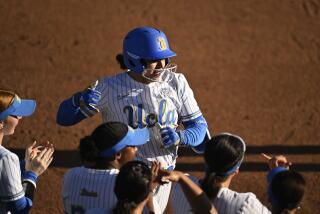Not So Easy Homecoming for Grieving Arizona Coach
This should be such a sweet homecoming.
Minneapolis is where Lute Olson attended college. Where he landed his first coaching job. Where he and his wife, Bobbi, started their family 47 years ago.
Minneapolis is also the site of the Final Four. Olson’s Arizona Wildcats will take the floor today against Michigan State in a semifinal.
It should be so special.
But homecoming isn’t the same without your date.
*
The Olsons were soul mates, two people who hit the jackpot the day they met. They lived their vows, loving and cherishing each other until death did them part.
Bobbi was the one to go, succumbing to a 2 1/2-year battle with ovarian cancer Jan. 1 at age 65. She left five children, 13 grandchildren and a pack of current and former Wildcat players who considered her a second mom.
She was as integral to Arizona basketball as her husband, the unflappable coach with a .770 winning percentage in 18 seasons. Players got their first taste when she made them apple-cinnamon pancakes during recruiting visits.
Her presence was continual.
When she entered McKale Center before a game to take her seat in Section 16, Row 2, the band greeted her brightly: “Hi, Bobbi!”
When the team returned from trips, she went straight to the players: “How’s the big guy treating you? You let me know if he’s giving you any trouble and I’ll talk to him at home. Maybe I’ll put a little more salt in his food.”
When freshman guard Steve Kerr’s father, the president of American University in Beirut, was assassinated in 1984, Bobbi enveloped him with warmth.
“I was only 18,” said Kerr, now playing for the San Antonio Spurs. “The rest of my family was in Beirut, and Bobbi immediately scooped me up, took me to their house for a few days, got me on the phone with my family, cooked for me and took care of me.”
She maintained contact after players left Arizona, asking for photos of their children and updates on their lives.
“She was like a second mother to me,” said Portland Trail Blazer guard Damon Stoudamire, who played for Arizona from 1991-95. “Their door was always open and she treated me like I was her own.”
Bobbi, radiating acceptance and joy, was the perfect counterpart to the distinguished, reserved Lute, whose own glow is strictly gray eminence. You rarely saw her without him, rarely him without her.
Now she is gone, but signs remain. At nearly every Pacific 10 Conference arena Arizona visited, roses were placed on her empty seat. The court at McKale Center is named Lute and Bobbi Olson Court. A billboard near the Metrodome that bears the words, “Four Bobbi,” is one of seven in Minneapolis and Tucson erected by Arizona alumnus Karl Eller as a tribute.
Lute, intensely private yet enormously appreciative of the outpouring, pushes on with his guard down. The impenetrable armor behind his tailored suit and no-nonsense expression is gone. Grief has a way of dissolving vanity, self-importance and ego, leaving only . . .
“Emptiness, because she’s not there with you,” he said.
*
Lute and Bobbi met as teenagers growing up in North Dakota, in a time of purity and place of simplicity.
A 6-foot-4 three-sport athlete from a Mayville farm, Lute spent weekends flirting and courting at the Dairy Queen owned by Bobbi’s father in Grand Forks, N.D. He married Bobbi during his sophomore year at tiny Augsburg College in Minneapolis. She worked days as a legal secretary and he nights at a soft drink plant after football, basketball or baseball practice.
Lute began coaching at age 22 at Mahnomen (Minn.) High, left after two years for a high school near Duluth, then packed up three years later and moved to California in 1961. By then the Olsons had three children.
“Bobbi had such a reputation for being Lute’s closest friend and biggest supporter throughout his career, and it started early,” said Al Santwire, who played for Olson at Mahnomen High in 1956-57. “Bobbi was very involved in our team just like she was with Lute’s teams in Arizona. It was a big, big part of her life.”
Two more children came along while Lute coached at high schools in Anaheim and Huntington Beach for seven years. He moved on to Long Beach City College, winning the state title in 1971, coached Long Beach State to a 24-2 mark in 1973-74, then was hired to coach at Iowa.
Arizona called in 1983 and Tucson became home. Lute and Bobbi spent mornings taking long walks in the hills outside their ranch. As their children began to leave home, Bobbi stayed in stride with her husband, accompanying him on trips.
“She was such a constant fixture on the road and at the games,” said senior forward Justin Wessel. “It gave you a lot of encouragement to come off a tough game and see her there for that hug.”
From a fateful day in June 1998 forward, it was Bobbi who needed encouragement. Lute was teaching at a basketball clinic in Budapest, Hungary, when his wife developed stomach pains. She was diagnosed with cancer and underwent radiation treatments. By the following March the cancer was in remission.
Last August it returned with a vengeance.
“Ovarian cancer is such a difficult disease,” Lute said. “Everything can go along smoothly, then all of a sudden it got bad in a hurry.”
Lute, 66, spent mornings and evenings with her, but concealed the gravity of the situation from the team until he missed a game at Connecticut on Dec. 9 to be with Bobbi while she went through a medical procedure.
On Dec. 30, Lute gathered the team during a shoot-around and said he was taking a leave of absence. Normally the picture of poise, Lute broke into tears and walked out before finishing.
“Just to see the man go down and cry was hard,” Wildcat guard Gilbert Arenas said. “This guy was a god. He can have anything he wants in life. He can control anything he wants, but this was something he couldn’t control.”
Two days later, Bobbi died.
*
The Wildcats unraveled. Ranked No. 1 in preseason polls, Arizona lost a game the day the coach took his leave and was 10-5 when he returned Jan. 15.
By his own admission, it was too soon. Experts say mourning exacts a physical as well as emotional toll. Many consider grief an illness. Feelings of weakness, depression, guilt and impatience are pervasive.
But Lute told his children it was time to get back to their lives and they reciprocated the message. Early on, he was overly harsh with players. For the most part, however, the team empathized. The players just wanted him back.
“I know he’s hurting inside, but he’s a great man and he’s back now,” guard Jason Gardner said. “He’s the same old coach. It’s like he hasn’t missed a practice.”
Arizona beat USC and UCLA the week he returned, beginning a 17-2 run to the Final Four. If ever the overused opening to “Tale of Two Cities,” applies, this is it. Best of times, worst of times, indeed.
After the Wildcats defeated Illinois in the Midwest Regional final Sunday in San Antonio, Lute was showered with affection. His children and grandchildren were there. So were Kerr and Sean Elliott, another former Wildcat who Bobbi helped weather his own crisis, a kidney transplant.
Arizona was making its first trip to the Final Four since winning the NCAA title in 1997. It was a joyous day. Yet rarely has a man been so alone in a crowd.
“It’s difficult,” he said. “Part of the emotion is that I’m so pleased for our guys to have gone through what they have to achieve their season’s goal.
“It’s not been easy for any of us. The thing that’s gotten me through is my family. They know they need to prop me up a little bit. Through family and friends I think we’ve all been able to survive this.”
*
One in 56 women in the U.S. will be diagnosed with ovarian cancer, according to a cancer research institute. The rate rose 30% from 1985-95. In 1998, an estimated 14,500 American women died from the disease and 25,000 new cases were diagnosed.
More than 1,500 donations have been made to the Arizona Cancer Center in Bobbi’s memory and the center plans to build an endowment program for ovarian cancer research.
The woman touched so many lives. Her legacy will touch many more.
The Final Four pales in importance. Yet it will be a gathering place for those who cherish her memory and offer Lute comfort. Bobbi is alive in everyone she influenced and inspired, including those wearing Wildcat uniforms.
“She’s never going to leave our hearts,” forward Luke Walton said. “We want to win for Coach, for Mrs. Olson and for ourselves. Win or lose, she would understand we gave our best effort.”
Arizona knows loss. That’s a thought to hold when the horn sounds to end tonight’s game. The final score won’t have the same gravity.
Then again, Bobbi always did enjoy victory.
“I just remember her smile after we won that [1997] national championship,” said former Wildcat Jason Terry, now of the Atlanta Hawks. “Just to see her face. That was probably the brightest I’ve ever seen it.”
When the crowd disperses and the team disbands, Lute’s most difficult period begins. The absence of his wife will confront him in ways he can’t imagine.
Lute and Bobbi took yearly vacations to exotic locales and already had reservations this spring at a Mexican resort. Lute says he will still go, accompanied by his daughter, Christi, a single mom who lives with him and her four children.
“The good thing is that it’s not a case of looking back and saying, ‘Well, I wish we had done more things together,’ ” Lute said. “Any time we had, we spent it together.
“I think if there is anything that couples or families can learn, it’s that every day is precious. You need to live every day like it’s your last. I know it’s been said before, but I think it’s really true.”
Theirs was a love for ages.
Still is.
“We were together so long,” Lute said, “that she’s always there.”
More to Read
Go beyond the scoreboard
Get the latest on L.A.'s teams in the daily Sports Report newsletter.
You may occasionally receive promotional content from the Los Angeles Times.











